Holy Synod of Bishops concludes Spring Session
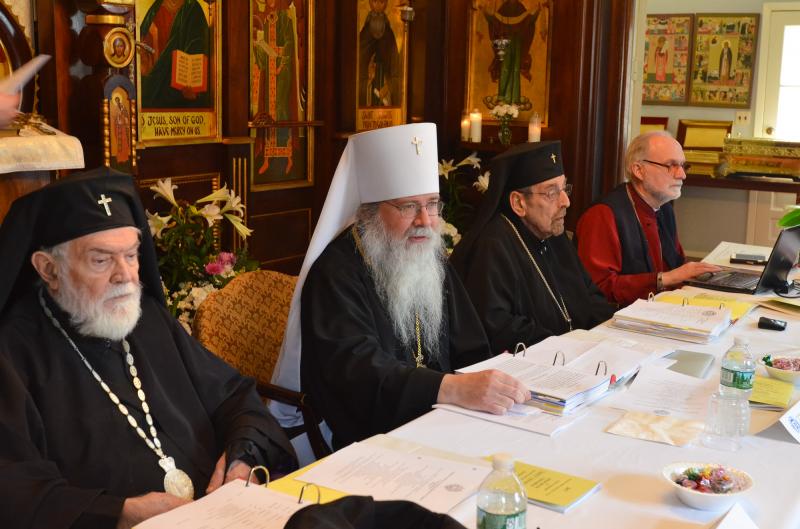
The Holy Synod of Bishops of the Orthodox Church in America concluded its Spring Session held at the Chancery of the Orthodox Church in America on Friday, April 20, 2018.
The gathering opened on Tuesday, April 17, with the celebration of the Divine Liturgy for the “Day of Rejoicing” in the Chancery’s Saint Sergius of Radonezh Chapel, at which His Beatitude, Metropolitan Tikhon presided. In his homily, Metropolitan Tikhon explained that the gathering of the Holy Synod “comes about by the design and grace of our great and loving God.” The entire text of Metropolitan Tikhon’s homily appears below.
At the conclusion of the Divine Liturgy, Metropolitan Tikhon welcomed the members of the Holy Synod.
“I welcome all of the brothers of our Holy Synod, as well as all those who are participating with us this week, to the Spring Session of our Holy Synod of Bishops of the Orthodox Church in America,” Metropolitan Tikhon said. “The opening of our session this week with the Divine Liturgy is our opportunity to give thanks to almighty God for the gift of unity and brotherly love that exists within our Holy Synod, and we ask that the Holy Spirit will guide us in our deliberations and decisions this week.”
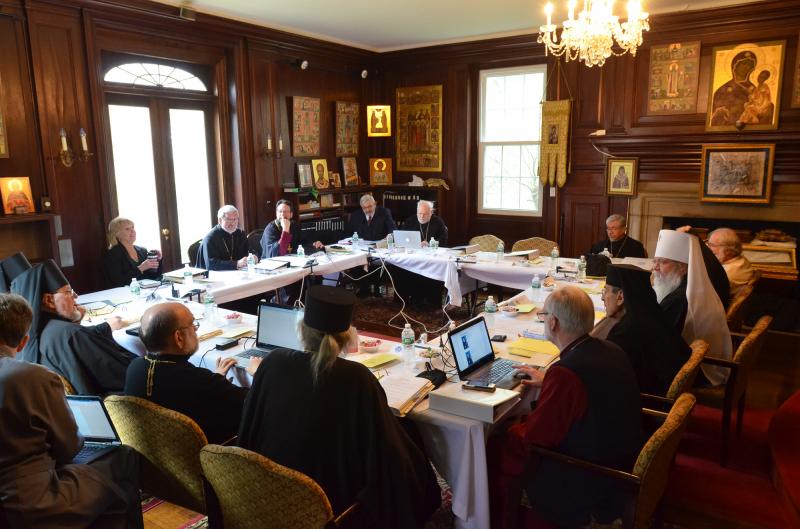
At the opening session, Metropolitan Tikhon reviewed the agenda’s priorities, chief among them being preparations for the 19th All-American Council. He went on to reflect on his participation in recent events commemorating the 50th anniversary of the assassination of the Rev. Dr Martin Luther King in Washington, DC.
“As is well known, Dr. Martin Luther King was assassinated in Memphis, having traveled there to support the sanitation workers during their strike,” Metropolitan Tikhon said. “The prayer which I prepared for this anniversary celebration took as its refrain the words and signs used by those sanitation workers to express their grievances. These were four simple words: ‘I am a man!’ These words spoke clearly of the desire of human beings to be accepted as human beings by others, which not only encapsulates the struggle of the civil rights movement, but also speaks in a very direct way to the goal of the incarnation and the economy of Christ, which is for all human beings to find healing in Christ and to become truly human, to become a man in the image of the archetype, the God-man Jesus Christ.
“To me, this is the core of our purpose as Christians, as the Church, and as the bishops and shepherds of that Church,” Metropolitan Tikhon continued. “The cry of the sanitation workers in 1968 is the cry of all human beings, all of us who, from the moment of His Passion and Crucifixion look to Jesus Christ, not to be told what is right, but to be shown it; not to be guided on the way, but to watch the Way; not to describe life, but to see our own life hanging before our very eyes.
“This is the foundation of our life as Christians and this is the foundation on which we must build the Church, this Orthodox Church in America, which is so precious to us,” Metropolitan Tikhon concluded.
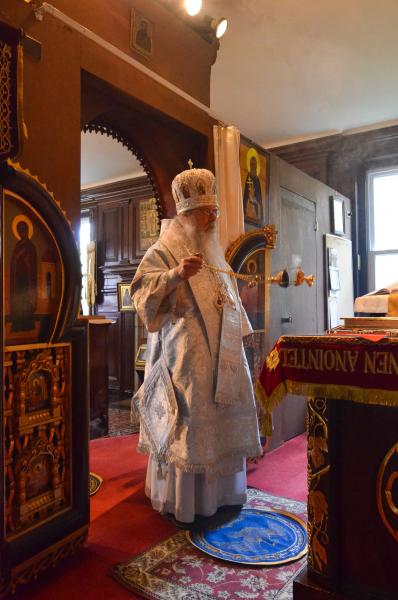
Metropolitan Tikhon further reflected on the task of building up the Orthodox Church in America by “continuing the missionary and pastoral focus of our ministry in the tradition of our local saints by coming to terms with reality and lovingly leading our people through the very difficult and very rapid changes we are experiencing…. All of our dioceses need the attention and support of the whole Church as we all face challenges of economy, population change and loss, preservation of our history and our stories, as well as physical property and an ever-growing post-Christian culture.” He shared his hope that the Holy Synod will be able to “both express a common vision for us as a Church and to clearly lay out both the challenges and the ways forward through those challenges.”
Members of the Holy Synod heard reports from the OCA’s Officers.
Archpriest John Jillions, Chancellor, reported on his work and introduced Hieromonk Nikodhim [Preston], who reported on the Department of Pastoral Life. Father John and Cindy Heise then presented the reports on the Office of Review of Sexual Misconduct Allegations [ORSMA] and the Sexual Misconduct Policy Advisory Committee. It was noted that Cindy, a trained social worker, is now a member of the Department of Pastoral Life, where she focuses on the health of clergy and their families.
Archpriest Eric G. Tosi, Secretary, reported on plans for the 19th All-American Council, slated to gather in Saint Louis, MO July 23-27, 2018. The Holy Synod reviewed and blessed the AAC’s agenda, handbook and updated instructions, and related matters, which will be released in the immediate future. He presented the new OCA Policy for Vendors and the new OCA Policy on Bequests and Gifts, passed earlier by the Metropolitan Council, which received the Holy Synod’s blessing. The minutes and decisions of the Metropolitan Council’s Spring 2018 Session also were blessed.
The OCA’s Treasurer, Melanie Ringa, presented the financial report and reviewed the budget for the 19th AAC and the remainder of 2018. On behalf of the Metropolitan Council, she presented for the Holy Synod’s blessing the Finance Resolution for the funding of the Church for the period after the 19th AAC. The Holy Synod blessed the Resolution, which will be reviewed by the Resolutions Committee and presented to AAC delegates for their consideration.
Protopresbyter Leonid Kishkovsky presented a report on the work of the Office of External Affairs and Interchurch Relations, which included a review of developments in the Orthodox Churches throughout the world. He also reported on the work of Archpriest Daniel Andrejuk, who began duties as Dean of the OCA’s Representation Church of the Great Martyr Catherine, Moscow, and Representative to the Moscow Patriarchate; the OCA’s involvement in various international events; and plans for upcoming primatial visits.
Judge E. R. Lanier, OCA General Counsel, reported on legal matters and updated the Synod on pending projects.
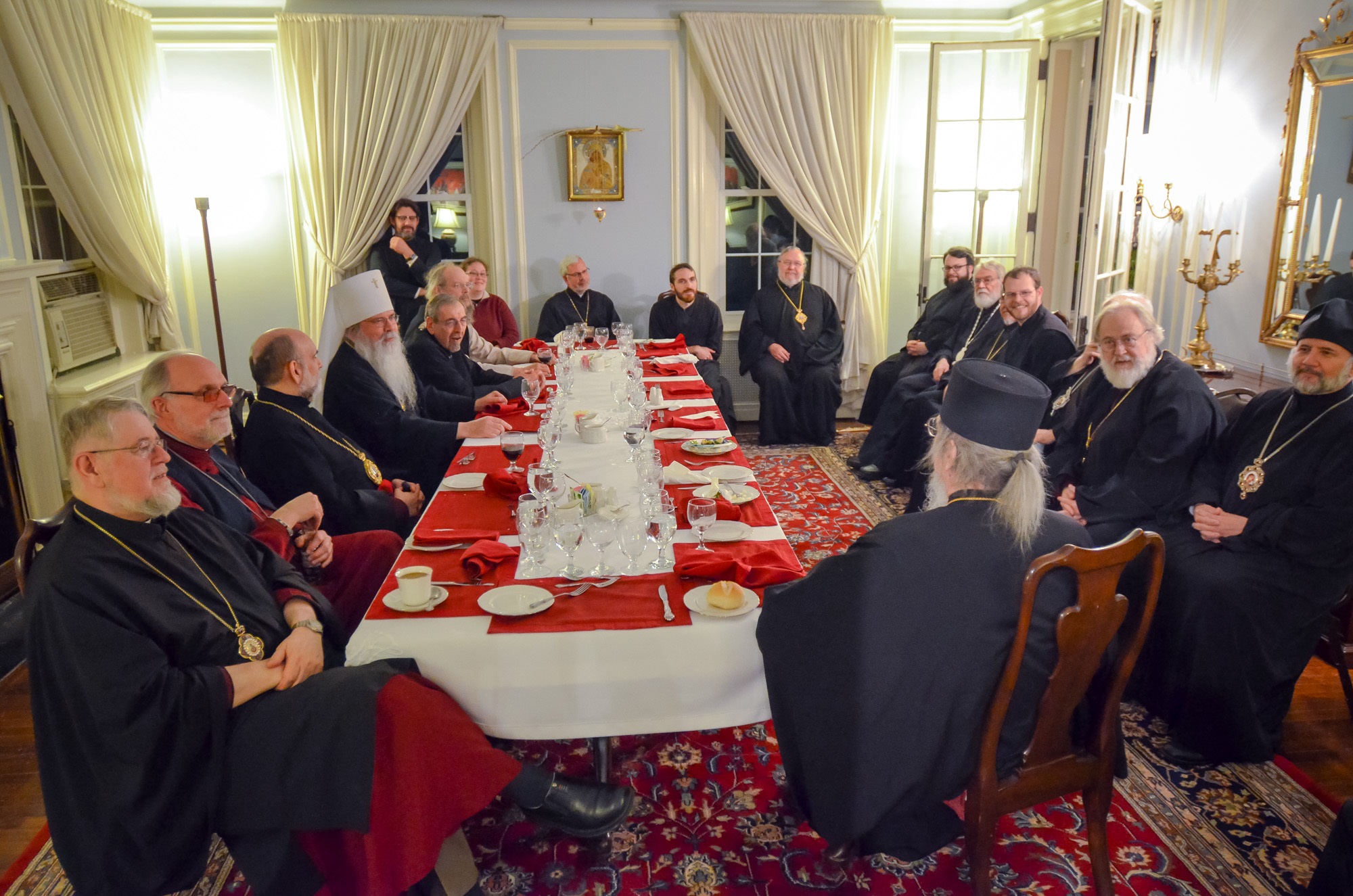
His Grace, Bishop Daniel of Santa Rosa, Chair of the Commission on Statutes and Canons, presented proposed Statute Amendments for consideration at the 19th AAC. The Holy Synod blessed three of the proposed amendments, all of which will be further reviewed by the Commission.
In other matters,
- Dr. David Drillock presented a report of the work of the Department of Liturgical Music and Translations, while Priest Christopher Rowe presented a report on the work of the Department of Youth, Young Adult and Campus Ministry.
- The President and Deans of Saint Herman’s Seminary, Kodiak, AK; Saint Tikhon’s Seminary, South Canaan, PA; and Saint Vladimir’s Seminary, Yonkers, NY presented reports on the status of their respective schools and their future plans.
- The Holy Synod reviewed the list of candidates for ordination, presented by Board of Theological Education, and approved those recommended for ordination. Individual clergy cases were reviewed and acted upon, while clergy awards and elevations were approved.
- The Holy Synod also heard reports from the Stewards of the Orthodox Church in America by Archdeacon Joseph Matusiak and the OCA Pension Plan by His Grace, Bishop David of Sitka and Alaska.
- A committee was appointed to begin planning celebrations associated with the 50th Anniversary of the granting of Autocephaly and the Canonization of Saint Herman of Alaska. His Eminence, Archbishop Benjamin of San Francisco and the West, will chair the committee.
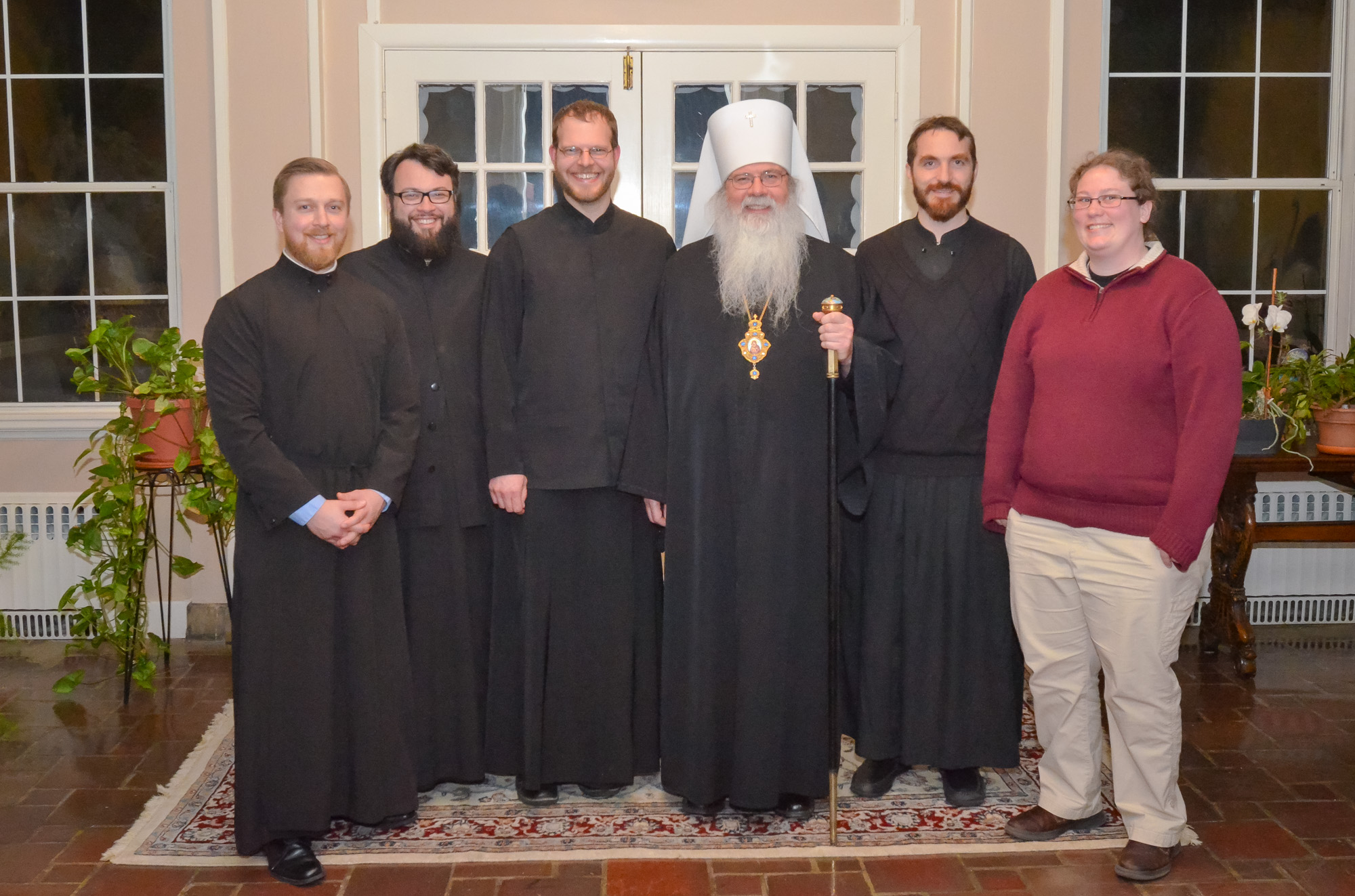
During the gathering, the members of the Holy Synod hosted the OCA’s 2018 seminary graduates for dinner, during which expectations on parish life were shared.
The Holy Synod of Bishops is the supreme canonical authority in the Church. It includes, as voting members, all the diocesan bishops of the Church. The Metropolitan is the ex officio Chairman of the Synod.
Metropolitan Tikhon’s Homily during the Divine Liturgy on the “Day of Rejoicing”
Spring Session of the Holy Synod of Bishops of the Orthodox Church in America
Tuesday, April 17, 2018
Saint Sergius of Radonezh Chapel
Christ is Risen!
We gather on this Day of Rejoicing, the second Tuesday after the Great Feast of Holy Pascha, which coincides with the opening session of our Spring Holy Synod meeting. Each of us has gloriously celebrated the feast in our respective dioceses, and today, we gather here at Saint Sergius Chapel as the one body of the Holy Synod to celebrate the Lord’s resurrection together as brothers in Christ and to give expression to the unity of the Church through the supreme act of unity: partaking of the Precious Body and Blood of our Lord, God, and Savior Jesus Christ at the mystical banquet of immortality.
Although our gathering this week has been planned and organized and placed on everyone’s calendar, it is ultimately not orchestrated by us, but rather comes about by the design and grace of our great and loving God. As the Apostle and Evangelist John reminds us in the well-known verse from today’s appointed Gospel, “For God so loved the world that He gave His only begotten Son, that whoever believes in Him should not perish but have everlasting life. For God did not send His Son into the world to condemn the world, but that the world through Him might be saved.”
This, my brothers, is why we are here. This is why we gather as a Holy Synod and as the Church, so that those of us who are perishing and are condemned might have everlasting life and might be saved.
This is also why we will gather in Saint Louis for the 19th All-American Council this coming July. The theme we have chosen, “For the Life of the World,” reflects well this fundamental reality of our existence as the Church: that we exist in this world of death and corruption, being mortal ourselves, and yet having not only the hope, but the confirmation, of life everlasting and healing in Christ.
As we know, there are different meanings of the term “the world,” and these are reflected both in the Scriptures and in the Patristic witness. “The world” can refer to the glorious creation fashioned by the Holy Trinity in the very beginning, but it can also refer to the fallen existence that this creation (and we human beings) now find themselves in. The tension between these two meanings was both felt and resolved in our recent solemn celebration of Holy Week and Pascha.
Perhaps the focal point of this tension was found at Matins of Great and Holy Friday, when we read the 12 Passion Gospels. The first of these, centered on the Great High Priestly prayer of our Lord Jesus Christ in the Gospel of John, we heard again today, as the reading appointed for the service at the opening of a sacred council. In this passage, Christ asks the Father to glorify Him, just as He has glorified the Father, so that He might, in turn, glorify us as well. He is addressing the men given to Him by the Father “out of the world,” and emphasizing that He is praying for them, and not for the world. Even though He is no more in the world, He turns to His disciples and says “these are in the world,” and His prayer is that they and we may be one as the Father and the Son are one.
As the members of the Holy Synod, we are the inheritors of this prayer of Christ, unworthy though we be, and we have the responsibility of bringing all of mankind, including our own sheep, into this unity. And we can accomplish this by God’s grace and in the Name of the Father, just as Christ kept them while He was with them.
There are challenges and heavy burdens to our synodal and episcopal work, and yet we must remain to do the Apostolic work that has been given to us to do. The Lord reminds the disciples that the world will hate them because they are not of the world, while at the same time praying not that the Father would take them out of the world, but that they would be preserved from the evil one. Not only this, but through the sanctification of the truth and His word they are also to be sent into the world, as the Father sent the Son into the world. In all of this, it is the unity of both the Father and the Son, as well as their unity with humanity, that is emphasized in this most powerful of prayers.
While this High Priestly prayer speaks to us of the glory and the unity of the Holy Trinity, it also speaks to our calling as human beings, which is to become authentic human beings, united in the love of the Holy Trinity, even in the midst of the world and all its troubles. In the end, this is where we should find our inspiration as bishops of the Church, and this is the message that we are called to proclaim. With all the decisions, problems, and challenges of the world that we will address this week, we are ultimately here, I believe, to encourage each other and to share with one another the joy of Pascha and to sing the words of the beautiful paschal hymn of Saint Gregory the Theologian:
Yesterday I was crucified with Christ, today I am glorified with Him;
Yesterday I died with Him, today I am made alive with Him;
Yesterday I was buried with Him, today I rise with Him.
Let us make an offering to the One Who died and rose again for us….
Let us offer our own selves, the possession most precious to God and closest to Him.
Let us give back to the Image that which is according to the image—
Recognizing our value, honoring the Archetype,
Knowing the power of the mystery and for whom Christ died.
To Him be glory, honor, and dominion unto ages of ages. Amen.
Christ is risen!
A photo gallery is available on the OCA web site and Facebook page.
